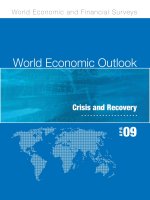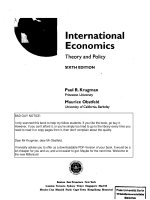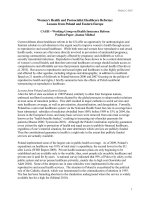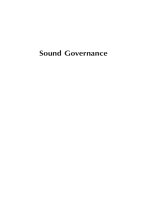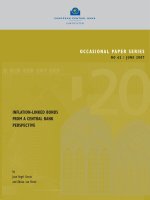INTERNATIONAL TRADE FROM ECONOMIC AND POLICY PERSPECTIVE ppt
Bạn đang xem bản rút gọn của tài liệu. Xem và tải ngay bản đầy đủ của tài liệu tại đây (4.32 MB, 266 trang )
INTERNATIONAL TRADE
FROM ECONOMIC AND
POLICY PERSPECTIVE
Edited by Vito Bobek
International Trade from Economic and Policy Perspective
Edited by Vito Bobek
Contributors
Maria Hamideh Ramjerdi, Carlos Brito, Ricardo Correia, Sujinda Chemsripong,
Jesús López-Rodríguez, Cosmin Bolea-Gabriel, Taufik Abdul Hakim, Imbarine Bujang,
Anita Maček, Andrés Cartín-Rojas, Mercy Mpinganjira, Mauro Silva Ruiz, Alexandre de Oliveira
e Aguiar, Pedro Luiz Cortez, Cláudia Echevenguá Teixeira, Gustavo Silveira Graudenz,
Mosè Gallo, Elpidio Romano, Liberatina Carmela Santillo, Romana Korez-Vide
Published by InTech
Janeza Trdine 9, 51000 Rijeka, Croatia
Copyright © 2012 InTech
All chapters are Open Access distributed under the Creative Commons Attribution 3.0 license,
which allows users to download, copy and build upon published articles even for commercial
purposes, as long as the author and publisher are properly credited, which ensures maximum
dissemination and a wider impact of our publications. After this work has been published by
InTech, authors have the right to republish it, in whole or part, in any publication of which they
are the author, and to make other personal use of the work. Any republication, referencing or
personal use of the work must explicitly identify the original source.
Notice
Statements and opinions expressed in the chapters are these of the individual contributors and
not necessarily those of the editors or publisher. No responsibility is accepted for the accuracy
of information contained in the published chapters. The publisher assumes no responsibility for
any damage or injury to persons or property arising out of the use of any materials,
instructions, methods or ideas contained in the book.
Publishing Process Manager Martina Durovic
Typesetting InTech Prepress, Novi Sad
Cover InTech Design Team
First published August, 2012
Printed in Croatia
A free online edition of this book is available at www.intechopen.com
Additional hard copies can be obtained from
International Trade from Economic and Policy Perspective, Edited by Vito Bobek
p. cm.
ISBN 978-953-51-0708-8
Contents
Preface IX
Section 1 International Trade Theories 1
Chapter 1 A Survey of Effects of International Trade on Growth 3
Maria Hamideh Ramjerdi
Section 2 Trade Patterns 15
Chapter 2 Regions as Networks: Towards
a Conceptual Framework of Territorial Dynamics 17
Carlos Brito and Ricardo Correia
Chapter 3 The Extent of Intra Industry Trade Between Thailand
and ASEAN Economic Community (AEC) 39
Sujinda Chemsripong
Chapter 4 Regional Dynamics in Romanian Counties:
Convergence and Trade 67
Jesús López-Rodríguez and Cosmin Bolea-Gabriel
Section 3 Government Policies and International Trade 97
Chapter 5 The Impact and Consequences of Tax Revenues’
Components on Economic Indicators:
Evidence from Panel Groups Data 99
Taufik Abdul Hakim and Imbarine Bujang
Chapter 6 A Comparative Analysis of the Economic
Effects of Cross-Border Mergers and
Acquisitions in European Countries 117
Anita Maček
Chapter 7 Transboundary Animal Diseases
and International Trade 143
Andrés Cartín-Rojas
VI Contents
Chapter 8 International Trade Promotion
in Southern Africa: Challenges and Lessons 167
Mercy Mpinganjira
Chapter 9 Technical Barriers to Trade of Leather and Footwear:
Impacts and Challenges Posed by International Standards,
Regulations and Market Requirements in Brazil 185
Mauro Silva Ruiz, Alexandre de Oliveira e Aguiar,
Pedro Luiz Cortez, Cláudia Echevenguá Teixeira
and Gustavo Silveira Graudenz
Section 4 Business Perspective of International Trade 207
Chapter 10 A Perspective on Remanufacturing
Business: Issues and Opportunities 209
Mosè Gallo, Elpidio Romano and Liberatina Carmela Santillo
Chapter 11 Optimizing Global Value Chain Activities
by Diagonal Cumulation of Origin 235
Romana Korez-Vide
Preface
Today's international trade is radically more complex. The revolution in information
and communication technologies fostered an internationalisation of supply chains
which created a nexus between trade, investment, and services which is at the heart of
so much of today's international commerce.
Fundamental changes in recent decades have heightened the need for new and viable
solutions to the problems of international trade. In the new climate of
internationalisation an expanding number of firms are engaged in international trade,
barriers have been coming down, and trading blocs, whose members may share the
advantage of lower tariffs and the absence of quotas, are beginning to predominate.
The degree of recent change has created an uncertainty that now demands new global
trade systems - a new set of rules for the new environment. This book tackles some of
the unresolved issues in international trade that will continue to press into the next
decades. Covering an array of topics critical to today's scholar, economic policy
designer and business leader, the book International Trade from Economic and Policy
Perspective is comprised of four sections:
Section on international trade theories starts from the fact that due to different factor
endowments and production possibilities, national economies produce a variety of
goods at different relative costs. The exchange of these goods can be beneficial to both
of the participating economies (trade advantage). Furthermore, economies can also
specialise in the production of the goods for which they have a comparative
production advantage (specialisation advantage). Theoretical critiques of international
trade based on comparative advantage and imperfect competition analyze the impact
of multi-national corporations and transfer of technology on patterns of trade. This
section explores different theories of international trade and their impacts on domestic
and global production and welfare.
Section on trade patterns is focused on regions. Regions interact with multiple actors,
and industrial companies are one of the most important players in this interaction.
Due to their strategic actions and relationships, companies are simultaneously present
in different regions and influence a territory’s dynamics and structure. Moreover,
territorial characteristics are also a condition that can shape a company’s action. This
reciprocal influence is recognized by an emerging theoretical background of relational
X Preface
geography. Interest in this phenomenon is also increasing within the industrial
network approach. However, the interactions between companies and regions have
not been sufficiently explained. There are also two cases presented in this context: (1)
One chapter focuses on the analysis of the different regional dynamics followed by
Romanian counties over the period 1995-2008 and the link between them and the
economic geography of the country. The analysis of the growth dynamics is carried
out for the 42 counties in which Romania is divided using different time spans. (2) The
second case explains the extent of intra-industry trade in Thailand’s foreign trade,
especially its main trading partner, the ASEAN Economic Community. The results
show that, parallel to Thailand’s trade with the world, its trade with the AEC is
moving towards intra-industry type trading. Moreover, the growth of intra-industry
trade between Thailand and the AEC shows that Thailand’s industrial base is
dramatically changing from low-technology products to high-technology industries,
especially since the ASEAN Free Trade Area agreement with AEC was put into effect
in 1993.
Section on government policies and international trade starts from the fact that trade policy
continues to be at the centre of the international economic policy agenda. It is an arena
of conflict between governments, multinational companies and non-governmental
organizations. It is a major source of tension between the United States and the
European Union. Trade policy has been criticized for operating in a way that damages
hopes for economic development in the Global South. Economic analysis has provided
a systematic framework for examining the underlying issues of international trade.
Economics provides a way of distinguishing the self-interested claims that trade is
harmful to some groups from other arguments that certain trade policies might benefit
the nation as a whole. Although economists have consistently stressed the overall
gains from international trade, and in recent years have stressed the measurement of
those gains, the debate over trade policy is a never ending one.
Section on business perspective of international trade consists of two chapters. The current
situation about the exploitation of natural resources and the increasing pollution
deriving from many human activities and, in particular, from all technological
products during their lifecycle is pushing toward a redefinition of products' design.
Actually, this requires also a more radical change in consumers' habits and, hence, in
the underlying business models. A possible answer to these needs could be recovery
activities of products at the final phase of their lifecycle. There are many recovery
options for end-of-life products, remanufacturing shows to be a very interesting one.
In the following chapter it is explored how can a specific form of diagonal cumulation
of origin affect the transaction costs of company’s global value chain activities if it is
introduced at supranational level and properly perceived by managers. Companies
can optimize their global value chain activities through proactive management of
Rules of Origin.
I'd really like to thank InTech publishing company for providing me with the
opportunity to become the editor for this book. I appreciate that they believed in me to
Preface XI
provide the knowledge and technical assistance to make this book a reality. We
collaborated to find great authors that helped us create this book. In the end, I believe
that the team of authors that was chosen provides the perfect blend of knowledge and
skills that went into authoring this book. I thank each of the authors for devoting their
time and effort towards this book; I think that it will be a great asset to the community!
I also wish to thank all of our technical reviewers. Their efforts helped to make this
book complete and we couldn't have done it without them.
Prof Vito Bobek
University of Applied Sciences FH Joanneum, Graz,
Austria
University of Maribor
Slovenia
Section 1
International Trade Theories
